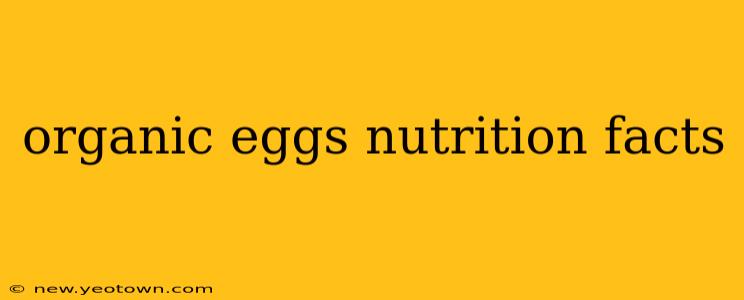For years, the humble egg has been a breakfast staple, a baking essential, and a versatile ingredient in countless dishes. But beyond its culinary versatility, the egg boasts a remarkable nutritional profile, especially when sourced organically. Let's dive into the world of organic eggs and uncover the nutritional riches they hold. My grandmother always said, "An egg a day keeps the doctor away," and after researching this, I believe there's some truth to that!
This isn't just another article about eggs; it's a story about the journey from henhouse to kitchen table, exploring the differences between organic and conventionally raised eggs and highlighting the nutritional benefits that make organic eggs a truly superior choice.
What Makes Organic Eggs Different?
The difference lies in how the hens are raised. Organically raised hens are free to roam, peck, and forage in pastures, enjoying a diet free from synthetic pesticides, herbicides, and genetically modified organisms (GMOs). This natural lifestyle significantly impacts the nutritional composition of their eggs.
Think of it like this: a hen living a stress-free life, eating a varied and natural diet, is going to produce an egg that reflects that healthy lifestyle. Conversely, a hen crammed into a small cage, fed a processed diet, will produce an egg with a less vibrant nutritional profile.
Are Organic Eggs More Nutritious Than Conventional Eggs?
Yes, studies show that organic eggs often contain higher levels of certain nutrients compared to conventionally produced eggs. While the differences aren't always dramatic, the cumulative effect is significant for your overall health.
Higher Levels of Omega-3 Fatty Acids:
Organically raised hens often have access to diets richer in omega-3 fatty acids, leading to eggs with a higher concentration of these beneficial fats. Omega-3s are crucial for brain health, reducing inflammation, and supporting cardiovascular health.
Increased Vitamin E:
Vitamin E, a powerful antioxidant, is often found in higher concentrations in organic eggs. This vitamin protects your cells from damage caused by free radicals, reducing the risk of chronic diseases.
More Vitamin A:
Organic eggs frequently contain more Vitamin A, essential for vision, immune function, and cell growth.
Enhanced Choline Content:
Choline, a nutrient crucial for brain development and function, is present in both organic and conventional eggs, but some studies suggest slightly higher levels in organic varieties.
What About the Cholesterol in Organic Eggs?
Many people worry about the cholesterol content in eggs. While it's true that eggs contain cholesterol, research has shown that dietary cholesterol has a less significant impact on blood cholesterol levels than previously believed. The focus should be on overall dietary fat intake and other lifestyle factors influencing heart health. Enjoying organic eggs in moderation as part of a balanced diet shouldn't be a cause for concern.
How Do I Choose the Best Organic Eggs?
Look for certifications like the USDA Organic seal to ensure the eggs meet specific standards for organic production. Supporting local farmers and farmers' markets allows you to connect directly with the source and learn more about their farming practices.
What are the benefits of free-range vs. caged eggs?
While "free-range" doesn't automatically mean "organic," it often suggests a more humane and potentially healthier environment for the hens. Free-range hens usually have more space to roam, leading to improved welfare and potentially influencing the nutritional content of their eggs, though not to the same extent as organically raised hens.
Are organic eggs better for the environment?
Yes, organic egg production generally has a smaller environmental footprint than conventional farming. The emphasis on sustainable practices, reduced pesticide use, and healthier soil contributes to a more environmentally friendly approach to food production.
In conclusion, choosing organic eggs is an investment in your health and the well-being of the planet. From the enriched nutritional profile to the ethical farming practices, organic eggs offer a superior choice for the discerning consumer. So, the next time you reach for eggs, consider the journey they've taken from hen to your plate and opt for the naturally nutritious option – organic.

